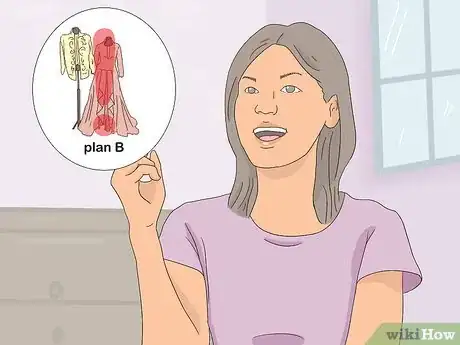This article was co-authored by Christina Millikin. Christina Millikin is the Founder and former CEO of Glow Events, an event planning agency based in San Francisco, California. Glow Events is a boutique event planning firm specializing in full event production and creative design for corporate and social events. Christina has worked with clients such as Salesforce, Heroku, Okta, and Netflix. Glow Events' work has been featured in Martha Stewert Weddings, InStyle, and SanFrancisco Magazine. Christina is an advisor to the management team at Glow, as well as a business advisor for the Goldman Sachs 10,000 Small Businesses program, and she has a BS in Marketing from the University of Florida.
There are 11 references cited in this article, which can be found at the bottom of the page.
wikiHow marks an article as reader-approved once it receives enough positive feedback. In this case, 100% of readers who voted found the article helpful, earning it our reader-approved status.
This article has been viewed 220,576 times.
Planning a wedding is a challenging, exciting, and sometimes crazy process. If that sounds like your kind of thing, being a wedding planner might be the perfect career move for you. But how do you get started? To help you out, we've put together the ultimate guide to become a wedding planner, regardless of how much experience you have. Keep reading to learn how to start pursuing this exciting, rewarding career.
Steps
Getting Skills and Experience
-
1Get an internship at a wedding planning company. Visit the websites of different wedding planning companies to see if they have any internship opportunities available. If you can’t find one, apply to a banquet or event planning internship at a major hotel to get some relevant experience.[1]
- Make sure your cover letter and resume are well written and up to date.
- If you’re interested in a particular company but can’t find any internship opportunities with them, don’t be afraid to reach out. Just make sure you’ve given their website a thorough search first.
-
2Volunteer at a wedding planning company if you have limited time. Internships can be extremely time consuming. If you’re working a full-time job while trying to learn the ropes of the industry, ask to volunteer as an intern at a reputable company a few times a week. It’s free work for them, and valuable experience for you!Advertisement
-
3Plan free events for family and friends. Experience is super important, so if you can’t get an internship or just want more practice, offer to plan birthdays, weddings, and parties for family and friends, free of charge. Treat these people like clients. It’s good practice for your future career, plus they can be valuable references down the line.
- Take pictures of the events so you can start building your portfolio.
-
4Apply for entry-level jobs at public relations or event planning firms. These jobs can help you develop your event planning and client management skills, both of which are key to breaking into the wedding planning business.[2]
-
5Take classes in photography and wedding design. As a wedding planner, you’ll need to help the couple pick out the decorations, the cake, and the wedding photographer. Taking classes in floral design, cake design, and photography can prepare you to make top notch decisions. Take online classes or see what’s available in your community.[3]
-
6Check out wedding planning blogs, books, and websites. Read, read, read. While there’s nothing like learning from experience, reading advice from other professionals can give you valuable insights, tips, and tricks.[4]
- The FabJob Guide to Become a Wedding Planner by Catherine Goulet & Jan Riddell is a great book for beginners. Wedding Planning and Management by Carrie Loveless & Maggie Daniel has useful information about the planning process, plus some good case studies.[5]
- Check out blogs like Bayside Bride and Snippet and Ink for style inspiration.[6]
- Visit Brenda’s Wedding Blog for a vendor guide, creative wedding decor and food ideas, and marketing tips: http://www.brendasweddingblog.com/blogs/.
-
7Take business or marketing courses if you are in college. As a wedding planner, you’ll be running a business, so a solid understanding of business is helpful. A degree in Communications, Public Relations, or Business can help equip you with the management and business skills that you’ll need in the wedding planning industry.[7]
- You can also take classes at your local community college or online.
- Don’t worry if you can’t take business classes. They’re helpful, but not necessary. Practical experience trumps all!
Understanding the Job Requirements
-
1Meet with the client to develop a personalized wedding plan. Working with clients is at the heart of wedding planning. Discuss the client’s preferences in detail and get a budget. Keep in mind that it’s your job to book the venue, select caterers, pick a photographer, hire music and entertainment, and consult the clients on invitations and wardrobe.[8]
- You’ll be responsible for coordinating all aspects of the wedding--rehearsals, the reception, the ceremony, and any travel arrangements--while sticking to the budget.
- Additionally, the wedding planner has to attend the wedding to make sure everything goes according to plan.
- Every client is different. Some will want to be super involved in the planning process, while others will just want to discuss the big picture. Talking to your clients and learning their preferences upfront will make your job a lot easier.[9]
-
2Respect the couple’s tastes. Remember, you should plan a wedding according to the couple’s preferences, not your own. It’s good to offer your judgment, but don’t let your own tastes dominate your client’s.[10]
- The couple may ask for color schemes or decor that you find downright unattractive. However, it’s their wedding, not yours, so honor their choices.
- Couples often ask for style advice. Feel free to give your opinions in this case.
-
3Work on your people skills. This job is all about interacting with people. Besides working with the (potentially stressed-out) couple to plan the wedding, you’ll have to deal with people involved in catering, entertainment, decorations, and the venue.[11] Plus, you’ll need to mingle with ease at the wedding and deal gracefully with rowdy relatives.[12]
- Being a good listener is key. You need to understand what your clients want so you can deliver a fantastic wedding that’s memorable--in a good way.
- Weddings can be stressful and emotional, so it’s important that you stay cool, calm, and collected throughout the process.
-
4Be organized. Planning a wedding requires some pretty intense multi-tasking. From flowers to cakes to seating plans, you’ll have to arrange everything on time and under budget. A digital or paper calendar is your best friend.[13]
- Create a separate file for each client. Write down all the important dates and every client request and vendor transaction.
- Make sure you are easy to reach. Have your phone with you at all times and regularly check your email.
-
5Maintain good relationships with your professional contacts. That includes companies you’ve interned for, clients, and vendors you’ve worked with. Always be professional and gracious. Networking can help you get jobs at wedding planning firms, bring in new clients, and get deals from top vendors.[14]
-
6Be prepared to work on weekends and after normal business hours. Most clients will have full time jobs, so they’ll need to meet with you outside of business hours. Plus, weddings are usually on the weekends, and you’ll need to be there to supervise.[15]
- Expect late night calls and consultations with the bride or groom.
- Responsiveness is vital to keeping your clients happy. Be prepared to take occasional unscheduled calls from a frazzled bride.
-
7Learn to handle issues with vendors. Planning a wedding isn’t all champagne and cake. In fact, you should expect hiccups throughout the process. A vendor may cancel at the last minute, or the wrong dress may get shipped. You need to stay calm in these situations and work with your available resources to solve the problem.
- Always have a backup plan, and show up with extra supplies that vendors might forget.[16]
- Don’t tell the couple about these issues unless it’s absolutely necessary. Do your best to sort them out on your own first.
- Make sure you maintain good relationships with all your past vendors so you have options in case of last minute cancellations.
Starting Your Business
-
1License your business. You may want to get a job at a wedding planning firm. However, if you’re starting your own wedding planning business, you’ll need to get it licensed. Licensing involves a combination of federal and local permits. Visit your local government’s website to see what steps you should take.[17]
- Keep in mind that there’s no specific wedding planner business license.[18]
-
2Create a website for your business. This is like your digital brochure. Your website should include your contact information, services offered, references, and high quality photos of your past weddings. A personalized business story is a nice touch.[19]
- Sites like Weebly and Wordpress offer easy-to-use website building software. You can use these tools for free, but you’ll have to pay for things like ad blocking, advanced templates, and a custom domain name.
- If you don’t have any photos yet, don’t use stock photos! Either leave your gallery blank, or set up some nice flower arrangements or table settings in your home and snap a few high quality photos.
-
3Develop a marketing strategy. Digital marketing is the easiest and cheapest way to reach clients. Consider using Facebook or Google AdWords to promote your business. Search for “wedding planners in [your area]” and try to list your business on a few of the top sites.[20]
- Check online directories like Team Wedding and Home of Top Wedding Sites for advertising rates.
- Local bridal shows can be a great place to network with vendors and meet potential clients. Presentation here is key, so make sure your booth looks sleek and professional.
- Enlist friends and family to distribute old school business cards and pamphlets. Bring them with you to bridals shows and community centers.
-
4Get the necessary paperwork for your clients. Ideally, you should have a client services agreement, a liability agreement, and a sales document that outlines your terms. These will protect you in case of legal issues. Talk to a lawyer to help you write up these documents.[21]
-
5Price your services according to the local market and your experience. See what your competitors are charging, and pick a similar price point. If you’re new, you should charge a little less than the seasoned professionals, but don’t knock too much off the price. You still need to make a profit, after all.[22]
- Negotiating prices with clients isn’t uncommon, but definitely think twice before lowering your prices for client. You don’t want to sell yourself short.
Additional Wedding Resources
Expert Q&A
-
QuestionWhat qualifications do you need to be a wedding planner?
 Christina MillikinChristina Millikin is the Founder and former CEO of Glow Events, an event planning agency based in San Francisco, California. Glow Events is a boutique event planning firm specializing in full event production and creative design for corporate and social events. Christina has worked with clients such as Salesforce, Heroku, Okta, and Netflix. Glow Events' work has been featured in Martha Stewert Weddings, InStyle, and SanFrancisco Magazine. Christina is an advisor to the management team at Glow, as well as a business advisor for the Goldman Sachs 10,000 Small Businesses program, and she has a BS in Marketing from the University of Florida.
Christina MillikinChristina Millikin is the Founder and former CEO of Glow Events, an event planning agency based in San Francisco, California. Glow Events is a boutique event planning firm specializing in full event production and creative design for corporate and social events. Christina has worked with clients such as Salesforce, Heroku, Okta, and Netflix. Glow Events' work has been featured in Martha Stewert Weddings, InStyle, and SanFrancisco Magazine. Christina is an advisor to the management team at Glow, as well as a business advisor for the Goldman Sachs 10,000 Small Businesses program, and she has a BS in Marketing from the University of Florida.
Founder & CEO, Glow Events First of all, you need the ability of creative problem solving and remaining calm under pressure. If you have that, you also need to have strong organization skills, be good at multitasking and keeping track of details. Really good people skills are important, as you will be dealing with lots of different personalities throughout the planning process, from your clients to different vendors and venues. You have to be able to manage the team of people so that everybody feel heard and respected while coming together for the common goal, that is, the event being successful. And that can take a lot of patience, empathy, and willingness to have conversations that sometimes are uncomfortable. Remember as well that owning a business means a lot of business administration, so you need to be very good at budget management, track costs and expenses, as well as handle HR issues.
First of all, you need the ability of creative problem solving and remaining calm under pressure. If you have that, you also need to have strong organization skills, be good at multitasking and keeping track of details. Really good people skills are important, as you will be dealing with lots of different personalities throughout the planning process, from your clients to different vendors and venues. You have to be able to manage the team of people so that everybody feel heard and respected while coming together for the common goal, that is, the event being successful. And that can take a lot of patience, empathy, and willingness to have conversations that sometimes are uncomfortable. Remember as well that owning a business means a lot of business administration, so you need to be very good at budget management, track costs and expenses, as well as handle HR issues. -
QuestionCan I combine the services for the cake, wedding gown, decorations and catering?
 Community AnswerYes, if you have the right experience.
Community AnswerYes, if you have the right experience. -
QuestionDo I need to take a wedding planner course?
 Community AnswerDifferent wedding planners will tell you different things, but generally these courses aren't nearly as helpful as getting real professional experience. Save your time and your money and get an internship, volunteer position, or job in the industry instead.
Community AnswerDifferent wedding planners will tell you different things, but generally these courses aren't nearly as helpful as getting real professional experience. Save your time and your money and get an internship, volunteer position, or job in the industry instead.
Warnings
- Creating a profitable wedding planning business takes time and effort. Make sure you’re passionate about wedding planning before you commit to this career path.⧼thumbs_response⧽
References
- ↑ http://www.huffingtonpost.com/sandy-malone/how-to-become-a-professio_b_4896125.html
- ↑ http://www.huffingtonpost.com/sandy-malone/how-to-become-a-professio_b_4896125.html
- ↑ https://www.topweddingsites.com/wedding-blog/wedding-planning/become-a-wedding-planner-2
- ↑ https://www.topweddingsites.com/wedding-blog/wedding-planning/become-a-wedding-planner-2#3
- ↑ http://weddingsforaliving.com/340-indispensable-wedding-planner-books
- ↑ http://www.huffingtonpost.com/kellee-khalil/wedding-blogs_b_2650071.html
- ↑ http://www.huffingtonpost.com/sandy-malone/how-to-become-a-professio_b_4896125.html
- ↑ http://learn.org/articles/Wedding_Planner_How_to_Become_a_Wedding_Planner_in_5_Steps.html
- ↑ Christina Millikin. Professional Event Planner. Expert Interview. 11 February 2020.
- ↑ https://www.topweddingsites.com/wedding-blog/wedding-planning/become-a-wedding-planner-2#7
- ↑ Hovik Harutyunyan. Event & Wedding Planner. Expert Interview. 21 February 2020.
- ↑ http://www.huffingtonpost.com/sandy-malone/how-to-become-a-professio_b_4896125.html
- ↑ https://www.topweddingsites.com/wedding-blog/wedding-planning/become-a-wedding-planner-2
- ↑ http://learn.org/articles/Wedding_Planner_How_to_Become_a_Wedding_Planner_in_5_Steps.html
- ↑ https://www.topweddingsites.com/wedding-blog/wedding-planning/become-a-wedding-planner-2
- ↑ http://www.brides.com/story/what-being-a-wedding-planner-is-really-like-sandy-malone
- ↑ https://www.sba.gov/business-guide/launch/apply-for-licenses-permits-federal-state
- ↑ https://www.topweddingsites.com/wedding-blog/wedding-planning/become-a-wedding-planner-2#3
- ↑ https://www.topweddingsites.com/wedding-blog/wedding-planning/become-a-wedding-planner-2#3
- ↑ https://www.topweddingsites.com/wedding-blog/wedding-planning/become-a-wedding-planner-2#3
- ↑ https://www.topweddingsites.com/wedding-blog/wedding-planning/become-a-wedding-planner-2#3
- ↑ https://www.topweddingsites.com/wedding-blog/wedding-planning/become-a-wedding-planner-2#3
About This Article
To become a wedding planner, spend time reading advice, tips, and insights on wedding planning blogs, books, and websites. Then, try taking some of your knowledge into the world by offering to plan free events for family and friends. You should also volunteer or intern at a wedding planning company to gain valuable experience. Alternatively, apply for entry-level jobs in public relations or event planning to help develop your event planning and client management skills. To learn how to start your own wedding planning business, keep reading!


















































































